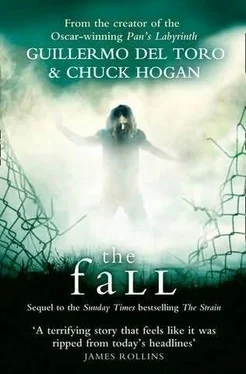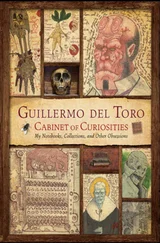Setrakian walked on from the old camp site, leaving its outline and retracing his old escape route into the forest. After many wrong turns, he arrived at the old Roman ruin, which looked unchanged to his eye. He entered the cave where he had faced and destroyed the Nazi Zimmer, broken hands and all-hauling the being into the light of day and watching it cook in the sun.
As he looked around inside, he realized something. The scores on the floor, the worn path inside the entrance: the cave showed signs of recent habitation.
Setrakian exited quickly and felt his chest constrict as he stood outside the foul ruin. He did sense evil in the area. The sun was dipping low in the west, darkness soon to take the region.
Setrakian closed his eyes in the manner of a priest in prayer. But he was not appealing to a higher being. He was centering himself, pushing down his fear and accepting the task that had presented itself to him.
By the time he had returned to the farmhouse, the locals had all gone home, the fields as still and gray as the graveyard they were.
Setrakian entered the farmhouse. He poked about a bit, just enough to make sure that he was indeed alone there. In the parlor, he received a fright. On the small reading table next to the best chair in the room, a finely carved wooden smoking pipe lay on its side. Setrakian reached for the pipe, taking it into his crooked fingers-and knew instantly.
The handiwork was indeed his. He had crafted four of these, carved at the order of a Ukrainian captain at Christmastime 1942, to be given away as gifts.
The pipe trembled in Setrakian’s hand as he imagined the guard Strebel sitting in this very room with his family, surrounded by the bricks of the death house, enjoying his tobacco and the fine ribbon of smoke trailing toward the ceiling-on the very site where the fire pits roared and the stench of human immolation rose like screams to the unhearing heavens.
Setrakian broke the pipe in his hands, snapping it in two, then dropping it to the floor and further crushing it with his heel, shivering with a fury he had not experienced in many months.
And then, as suddenly as it came-the mania passed. He was calm again.
He returned to the modest kitchen. He lit a single candle and placed it in the window facing the woods. And then he sat at the table.
Alone in the home, flexing his broken hands while he waited, he recalled the day he came upon the village church. He went seeking food, a man on the run, and discovered the religious house empty. All the Catholic priests had been rounded up and taken away. Setrakian discovered warm vestments in the small rectory adjacent to the church, and more out of necessity than any sort of plan-his clothes were tattered beyond repair, marking him as a refugee of some stripe, and the nights were very cold-he pulled them on. He came upon the ruse of the bandage, which no one questioned in a time of war. Even in silence, and perhaps out of a hunger for religion in that dark year, the villagers took to him, airing their confessions to this young man in holy garb who could only offer them a blessing with his mangled hands.
Setrakian was not the rabbi his family had intended him to become. He was something much different, and yet so oddly similar.
It was there, in that abandoned church, that he wrestled with what he had seen, at times wondering how any of it-from the sadism of the Nazis to the grotesquery of the great Vampire-could have been real. He had only his broken hands as proof. By then, the camp, as he had been told by other refugees to whom he offered “his” church as sanctuary-peasants on the run from the Armia Krajowa, deserters from the Wehrmacht or the Gestapo-had been wiped off the face of the earth.
After dusk, when full night had claimed the countryside, an eerie silence settled over the farm. The countryside is anything but quiet at night, and yet the zone surrounding the former death camp was hushed and solemn. It was as though the night were holding its breath.
A visitor arrived soon enough. He appeared in the window, his worm-white face illuminated by the candle flame flickering against the thin, imperfect glass. Setrakian had left the door unlocked, and the visitor walked inside, moving stiffly as though recovering from some great, debilitating disease.
Setrakian turned to face the man with trembling disbelief. SS-Sturmscharführer Hauptmann, his former taskmaster inside the camp. The man responsible for the carpentry shop, and all of the so-called “court Jews” who supplied skilled personal services to the SS and the Ukrainian staff. His familiar, all-black Schutzstaffel uniform-always pristine-was now in tatters, the hanging shreds revealing twin SS tattoos on his now-hairless forearms. His polished buttons were missing, as were his belt and black cap. The death-head insignia of the SS-Totenkopfverbände remained on his worn black collar. His black leather boots, always buffed to a high sheen, were now cracked and caked with grime. His hands, mouth, and neck were stained with the dried black blood of former victims, and a halo of flies clouded the air around his head.
He carried burlap sacks in his long hands. For what reason, wondered Setrakian, had this former ranking officer of the Schutzstaffel come to collect earth from the site of the former Treblinka camp? This loam fertilized with the gas and ash of genocide?
The vampire looked down upon him with rusty red eyes, its gaze remote.
Abraham Setrakian.
The voice came from somewhere, not the vampire’s mouth. Its bloodied lips never moved.
You escaped the pit.
The voice within Setrakian was deep and broad, reverberating in him as though his spine were a tuning fork. That same, many-tongued voice.
The great vampire. The very one he had encountered inside the camp-speaking through Hauptmann.
“Sardu,” said Setrakian, addressing him by the name of the human form he had taken, the noble giant of legend, Jusef Sardu.
I see you are dressed as a holy man. You once spoke of your God. Do you believe He delivered you from the burning pit?
Setrakian said, “No.”
Do you still wish to destroy me?
Setrakian did not speak. But the answer was yes.
It seemed to read his thought, its voice burbling with what could only be described as pleasure.
You are resilient, Abraham Setrakian. Like the leaf that refuses to fall.
“What is this now? Why are you still here?”
You mean Hauptmann. He was made to facilitate my involvement in the camp. In the end, I turned him. And he then fed upon the young officers he once favored. He had a taste for pure Aryan blood.
“Then-there are others.”
The chief administrator. And the camp doctor.
Eichhorst, thought Setrakian. And Dr. Dreverhaven. Yes indeed. Setrakian remembered them both well.
“And Strebel and his family?”
Strebel interested me not at all, except as a meal. Those bodies we destroy after feeding, before they begin to turn. You see, food here has become scarce. Your war is a nuisance. Why create more mouths to feed?
“Then-what do you want here?”
Hauptmann’s head tilted unnaturally, his full throat clucking once, like a frog’s.
Why don’t we call it nostalgia. I miss the efficiencies of the camp. I have become spoiled by the convenience of a human buffet. And now-I am tired of answering your questions.
“One more then.” Setrakian looked again at the sacks of soil in Hauptmann’s hands. “One month before the uprising, Hauptmann directed me to construct a very large cabinet. He even supplied the wood, a very thick ebony grain, imported. I was given a drawing to copy, carving into the top doors.”
Indeed. You do good work, Jew.
Читать дальше
Конец ознакомительного отрывка
Купить книгу












